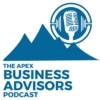Book Club #38: The Psychology of Money, by Morgan Housel
 Oh, brother, not another book about money!
Oh, brother, not another book about money!
We understand. It’s a topic that many like to write about but so few of those writers often deliver really worthwhile ideas. Morgan Housel’s The Psychology of Money, however, is an exception to that rule.
Rather than offering “how to” advice on what to do with money, Housel instead challenges the way we may think about money, offering helpful reframes in place of platitudes.
Luck
We’ve often heard variations of the same theme when entrepreneurs share their “I made it” stories: work really hard, then you’ll make it. Very few entrepreneurs actually articulate that often, a big, lucky break made a huge difference.
Local entrepreneur Danny O’Neill of the Roasterie, however, is one of those people. A story he often shares is that during an internal crisis due to an earthquake at one of its headquarters, his bank managed to “forget” about his mortgage payment for about three months. That happened to also coincide with a cash crunch the Roasterie faced. By the time the bank called asking for its money, the Roasterie had weathered the storm and Danny had the money to pay what he owed. “But for that earthquake…” he often muses.
While it may be true that, “the harder I work, the luckier I get,” sometimes business owners get lucky and need to be more honest about that because it’s not replicable. You can sometimes do everything right but still miss that bit of luck necessary to help your business turn that corner, and other times you were doing everything wrong, but a bit of luck saved you.
Enough
A very famous story that Vanguard founder John Bogle retold at the beginning of his book Enough relates to author Kurt Vonnegut. They were at a billionaire’s party and Vonnegut told his friend and fellow author Joseph Heller that the billionaire made more in a single day than Heller had earned from Catch-22, ever.
Heller responded, “Yes, but I have something he will never have — enough.”
We often talk about the fact that business owners, when it comes time to sell, often share numbers that don’t have relation to reality.
“That’s what I need to retire, so it needs to be worth that.”
“That’s 30 years of blood, sweat, and tears, so that’s what it’s worth to me.”
“Well, it has to be worth that because (trusted advisor who has never bought or sold a business in his/her life) told me.”
The reality is that more business owners need to think about what is “enough” for them. That “enough” should, advisedly, be an after-tax number. Then, they should engineer their businesses so that they will sell for at least that amount. Anything more will be enjoyable gravy.
Getting vs Keeping
Housel also talks about the fact that what it takes to acquire wealth is not at all the same skill set as what it takes to keep wealth. Indeed, one has only to see the number of great fortunes casually lost over the years by successive generations to see that the skill of keeping wealth is perhaps the most necessary of all.
The same is true in business. As you build up, you take risks, try everything, and work endless hours. This is not only commendable but often necessary.
But as your business matures, you still need to take risks but need to also mitigate those risks properly. You do need to try everything, but you need to always start from a base of what consistently works. And you do need to work those endless hours that entrepreneurs often do, but that should also be accompanied by plenty of sleep and some serious vacations.
What got you here won’t get you there, in money, in business, and in life.
It’s Different this Time
Housel says that “it’s different this time” might be four of the most dangerous words in investing. But business owners should also feel that way about economic downturns. Whether it’s a pandemic that no one planned for or one of the seeming cyclical downturns that happened in America in the last 30 years, when you start to feel and hear rumors of a recession, you need to take precautions as a business owner.
Yes, there are arguments that cautious behavior can make a recession happen that might have otherwise been staved off, but no one can really argue that cautious behavior of business owners is what crashes economies. At best, it’s a slowing down, and if an economy crashes simply for slowing down, it’s not a healthy economy anyway.
Use the lessons you learned from the last economic downturn when you see another one brewing. There’s very little downside to a bit of caution when the skies seem dark.
Did you enjoy this review? We’ve got dozens more in our book club category.


